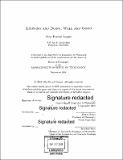Knowing and doing, well and good
Author(s)
Jaques, Abby Everett, Ph. D. Massachusetts Institute of Technology
DownloadFull printable version (10.81Mb)
Other Contributors
Massachusetts Institute of Technology. Department of Linguistics and Philosophy.
Advisor
Kieran Setiya.
Terms of use
Metadata
Show full item recordAbstract
My dissertation explores the relationship between intentional action and knowledge. I argue that understanding this relationship is not only of central importance to action theory; it is also a means to progress on questions about the nature of knowledge, the mechanisms of oppression, and the foundations of ethics. The opening chapter argues for my view of the nature of intentional action. I show that it is distinguished from nearby phenomena by an aim of control-and that this control turns out to be Anscombean practical knowledge, the special knowledge an agent can have of what she is doing, how, and why. The second chapter considers how my view about the knowledge-action relationship differs from those advocated by 'shifty epistemologists'-theorists who claim that what you know depends on practical factors like what's at stake for you. I argue that my view undermines the motivation for this claim and may debunk it. The third chapter presents a new way of understanding epistemic injustice and describes how epistemic injustice (thus understood) interacts with action's constitutive aim of practical knowledge to cause shackling-a distinctive dilemma faced by marginalized agents that both manifests and constitutes oppression. The fourth chapter shows how my view of the nature of intentional action entails a new kind of constitutivism about practical reason. I raise a worry that this form of constitutivism threatens the existence and/or generality of moral reasons before suggesting some possible ways out.
Description
Thesis: Ph. D., Massachusetts Institute of Technology, Department of Linguistics and Philosophy, 2018. Cataloged from PDF version of thesis. Includes bibliographical references.
Date issued
2018Department
Massachusetts Institute of Technology. Department of Linguistics and PhilosophyPublisher
Massachusetts Institute of Technology
Keywords
Linguistics and Philosophy.